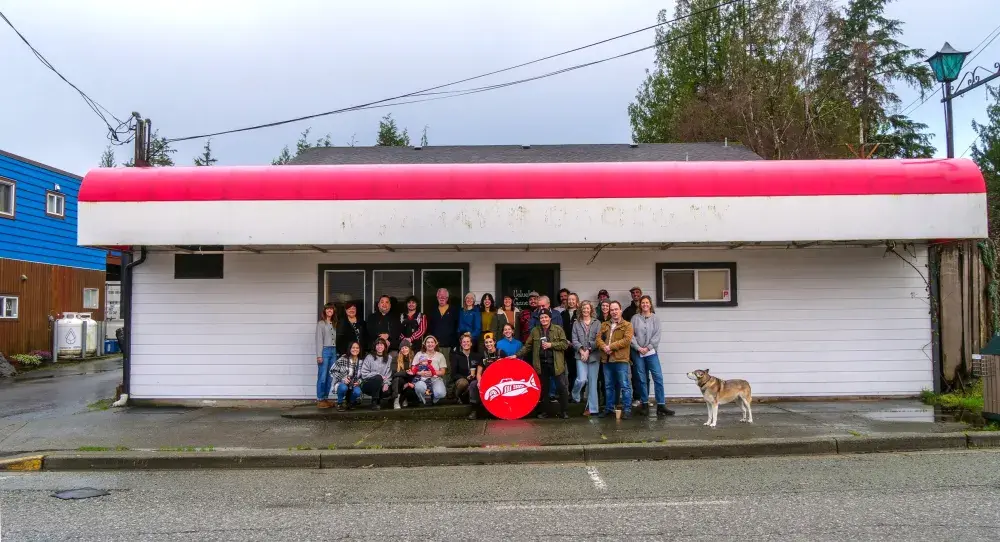A new stewardship centre in Ucluelet will educate and engage visitors through interactive activities and exhibits showcasing the relationship between human activity and natural ecosystems.
The project is led by the Redd Fish Restoration Society, a registered charity focused on ecosystem restoration, research and education. The project is moving forward through collaboration with the five nuučaanuł Nations located in Clayoquot and Barkley Sounds.
The new interactive tourism experience will go alongside a social enterprise business that is expected to benefit from the growing demand for eco-tourism experiences across the west coast of Vancouver Island.
The centre, still in its early stages of development, will include interactive exhibits, multi-media displays, interpretive materials and pieces on Indigenous stewardship.
“The stewardship centre will serve as a year-round and inclusive space that includes interactive interpretive displays focused on ecosystem restoration, regional history and ecology, and nuučaanuł culture and stewardship of these lands and waters,” said Jen Dart, operations and development manager with Redd Fish Restoration Society. “Displays will be both static and interactive, and the centre will include play areas, event space, a coffee bar and a gift shop. We aim to create a space that will be welcoming to all, and utilized by locals, visitors and school groups.”
Dart said the project is in the very early stages of development and the society has presented to Ucluelet council and hope to begin other meetings with the First Nations soon.
“Collaboration with the nuučaanuł Nations in Clayoquot and Barkley Sounds on the stewardship centre will be similar to how we work with the nations on an ongoing basis,” Dart said. “We seek the permission of each of the nations to partner to complete restoration priorities in their hahuułi (territory), and this project will be much the same.”
As part of the centre, Dart said the goal is to have a rotating exhibit that would create opportunities for Nuu-chah-nulth knowledge to be shared.
“All educational content within the centre that speaks to nuučaanuł culture, knowledge and history will be told and described with permission and with the perspective of nuučaanuł individuals and nations,” Dart said.
The development is made possible from a new project investment with Island Coastal Economic Trust.
“The Redd Fish Stewardship Centre has long been the society’s goal to showcase the vital work we do in this area in partnership and with permission from the nuučaanuł Nations,” states Jessica Hutchinson, executive director of the Redd Fish Restoration Society in a press release. “It is exciting to share the restoration story with locals and visitors alike through the development of the stewardship centre, all while generating further investment and employment into local ecosystems.”
According to the press release, the Tla-o-qui-aht First Nations, Toquaht Nation Government, Yuułuʔiłʔatḥ Government, the District of Tofino and the District of Ucluelet have all expressed support for this project and the society, which has an Indigenous-led board of directors and has operated on the west coast for decades.
Earlier this year, the society purchased a property at 1728 Peninsula Rd. in Ucluelet that will become both the organization’s base of operations and the future home of the Redd Fish Restoration Stewardship Centre.
Revenues raised through entry fees, retail store and coffee bar sales, and space rentals is expected to create sustainable funding for the society to reinvest in new coastal habitat restoration and employment-generating projects.
Over the past 27 years, Redd Fish has collaborated with five nuučaanuł First Nations to employ both scientific methods and traditional Indigenous knowledge to address environmental challenges effectively, states the press release. The society’s board of directors include representation from five nuučaanuł nations: Ahousaht, Hesquiaht, Tla-o-qui-aht, Yuułuʔiłʔatḥ and Toquaht.
Through the new centre, the organization aims to build on these relationships, while further integrating into the community to support local ecological, cultural and economic development. Their goal is to enhance local stewardship efforts and contribute to broader conservation goals.
The project, which will be underway this fall, targets a June 30, 2026 completion date.

